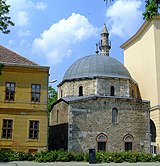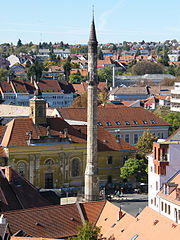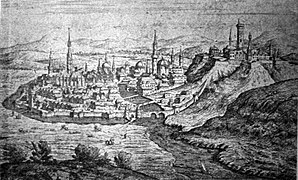
by percentage of country population
| 95–100% | |
| 90–95% | |
| 50–55% | |
| 30–35% | |
| 10–20% | |
| 5–10% | |
| 4–5% | |
| 2–4% | |
| 1–2% | |
| < 1% |
Islam in Hungary dates back to at least the 10th century. The influence of Sunni Islam was especially pronounced in the 16th century during the Ottoman period in Hungary.
History
Early history
Main articles: Böszörmény and IsmāʿīlīIn the old form of the Hungarian language, Muslims were called Böszörmény, cognates with Turkish Bozulmamış, which in turn descends from Arabic: مسلم, Muslim, a term preserved as both a family name, and as that of the town Hajdúböszörmény.
The first Islamic author to speak of this Muslim community was Yaqut al-Hamawi (575-626 AH/1179-1229 CE), he writes about a famous Hungarian student who studied in Aleppo, according to the student there were 30 Muslim villages in Hungary. Yaqut writes in his famous geographical dictionary, "Mu'ajam al-Buldan", about his meeting with a Hungarian Muslim youth in Syria who was studying Islam there and brought some details of the history and life of their people in Hungary.
The Spaniard Muslim traveler Abu Hamid al Garnati wrote of two types of Muslims in Hungary, the first being the Böszörmény of the Carpathian Basin and Volga Bulgars (Khwarezmians). He reported that Géza II of Hungary expressed a great fondness of Muslims.
In the 11th century, St. Ladislaus and later Coloman passed laws against the non-Christians (Synod of Szabolcs). These laws subdued Islam by coercing Muslims to eat pork, go to Church, intermarry, and to forbid them from celebrating Friday. Some of Coloman's laws include:
§ 46 If someone catches Ismaelites in fasting or eating or on keeping away from pork or in ritual washing or in other false practices these Ismaelites have to be sent to the king and whoever sued them shall receive a share from their properties.
§ 47 We command all Ismaelite villages to build a church and finance it. After the church is built the half village should move and settle elsewhere in order to become similar to us in living together and also in Christ and in Church (i.e. become similar in faith).
§ 48 Ismaelites should not marry their daughters to their nation but only to our nation.
§ 49 If an Ismaelite has guest, or he invites someone to his house to eat, he and his guests should all eat only pork.
László (Saint Ladislaus) passed the following law:
§ 9 on the merchants called Ismaelites, if becomes evident from them then after their baptism they return their old laws based on circumcision they should leave their homes but if they prove innocent they should stay.
These laws discriminated severely against the small minority.
Muslims in Hungary were reported to have often worked in the field of trade and finance. Hungarian royal coins from between the 12 and 13th centuries were found to have Arabic inscriptions (whilst this does not directly imply a connection with Islam, Arabic-speaking populations were predominantly Muslim). Káliz Road, named after the Khalyzians, was a trade route between Szeged and the Danube used for the transport of salt from Transylvania. A ring with an Arabic inscription was found in the grave of Béla II of Hungary. Jenő Szűcs states that prior to the Mongol invasion, "the country was pretty much strewn with military and merchant colonies of Muslim religious groups".
Turkish rule in Hungary
Main article: Ottoman Hungary
The Turks entered Hungary after the Battle of Mohács in 1526. From 1541, they started to control the central part directly and organized five eyalets: Budin, Kanije, Eğri, Varat (Oradea), and Temeşvar.

In the 16th century, during the Ottoman rule, numerous Muslim personalities were born in Hungary. Among them, the most important were the Ottoman Grand Vizier, Kanijeli Siyavuş Pasha (from Nagykanizsa) who held the function three times between 1582 and 1593, the Ottoman historian İbrahim Peçevi (Ibrahim of Pécs), and the famous Mevlevian dervish Pecsevi Árifi Ahmed Dede, also a Turk native of Pécs. Most Islamic studies in Hungary were taught according to the Hanafi madhhab, or Hanafi school of thought, of Sunni Islam.
Turkish rule in the Hungarian lands ended definitively in 1718, with the signing of the Treaty of Passarowitz. The Ottoman period left behind a legacy of Turkish architecture such as mosques, türbes, and public baths (hamams), as well as changes in the local cuisine, such as the popularization of coffeehouses and the introduction of paprika, an essential spice in Hungarian dishes.
Modern era
In the 19th century, after the collapse of the revolution of 1848-9, more than 6,000 emigrated Poles and Hungarians followed General Józef Bem (Murat Paşa) into Turkish exile. Among them were such Hungarian officers such as Richard Guyon (Kurşid Paşa), György Kmety (Ismail Paşa) and Maximilian Stein (Ferhad Paşa). These personalities were afterwards raised to the post of General.
Guyon is described in the Oxford Dictionary of National Biography as "the first Christian to obtain the rank of pasha and a Turkish military command without being obliged to change his religion", a sign of modernizing meritocracy under the 19th-century Ottomans.
The council of Újbuda has given permission for the Muslim community in Hungary to build the first Islamic centre in Budapest. The new Islamic centre will hold a library containing 50,000 volumes.
In 2013, the Hungarian Islamic Council requested for the Grand Mufti of Bosnia and Herzegovina Husein Kavazović to also become Grand Mufti of Hungary.
Religious law
Hungary's new "Law on the Right to Freedom of Conscience and Religion, and on Churches, Religions and Religious Communities" was enacted 12 July 2011 and recognizes only 14 religious groups. Islam is not included in this list and Muslims have to apply to get official recognition under the new law. Under the law, only 14 of 358 registered churches and religious associations will be granted legal recognition, while others will have to reapply for legal registration after two-thirds approval in parliament.
On 27 February 2012, Hungary's parliament amended the country's controversial law on religious organizations by expanding the list of officially recognized organizations to include the Hungarian Islamic Council.
Demographics
According to the 2011 Hungarian census, there were 5,579 Muslims in Hungary, making up only about 0.057% of the total population. Of these, 4,097 (73.4%) declared themselves as Hungarian, while 2,369 (42.5%) as Arab by ethnicity. In Hungary people can declare more than one ethnicity (which explains why the sum of these percentages is greater than 100%), Data from 2011 does not show the Turkish population (which was 1,565 in the 2001 census). However, the majority of Muslims in Hungary are of Arab or Turkish origin. Moreover, there is also a growing number of ethnic Hungarian converts to Islam.
The actual number of Muslims in Hungary is likely to be above 5,579 Muslims. Following the war in Syria, an important influx of asylum seekers arrived in 2014, 2015 and 2016 where more than 200,000 asylum applications were filed in Hungary. However, from 2017 and onwards, Hungarian authorities have registered less than few hundred applications.
Notable people
- Gyula Germanus, writer and politician, islamologist
- István Horthy Jr., physicist and architect, grandson of Admiral Miklós Horthy
- Ibrahim Muteferrika, publisher, economist, historian, Islamic theologian, sociologist
- İbrahim Peçevi
Gallery
-
The türbe of Gül Baba, several works of Islamic art can be visited
-
 The türbe of Idrisz Baba in Pécs
The türbe of Idrisz Baba in Pécs
-
Érd minaret seen in 2015
-
 Former mosque of Pasha Qasim in Pécs, now used as a Catholic church
Former mosque of Pasha Qasim in Pécs, now used as a Catholic church
-
 Eger city in 16th century with mosques and minarets
Eger city in 16th century with mosques and minarets
-
 Malkoç Bey Mosque in Siklós
Malkoç Bey Mosque in Siklós
-
 The ruins of the mosque in Esztergom
The ruins of the mosque in Esztergom
-
 The Turkish bath in the Rác Thermal Bath
The Turkish bath in the Rác Thermal Bath
-
 Idrisz Baba's well
Idrisz Baba's well
-
 Transformed Dunaföldvár church fortress
Transformed Dunaföldvár church fortress
-
 Minbar of the Yakovalı Hasan Paşa Mosque, Pécs, Hungary
Minbar of the Yakovalı Hasan Paşa Mosque, Pécs, Hungary
-
 The remains of the Ottoman wooden bridge pile marks in Szolnok
The remains of the Ottoman wooden bridge pile marks in Szolnok
See also
- Hungarian Islamic Council
- Gül Baba
- Almış (Almas) iltäbär
- Kaliz
- Islam in Romania
- Islam in Slovakia
- Turks in Hungary
- 'Magyar törzsek', title translated into English 'Hungarian tribes'; URL: https://hu.m.wikipedia.org/Magyar_t%C3%B6rzsek (page in Hungarian)
References
- "Muslim Population Growth in Europe Pew Research Center". 2024-07-10. Archived from the original on 2024-07-10.
- Hajduboszormeny | HajduPorta
- (cf. "The Islamic Review", London, February 1950, 38th vol., No.2).
- (comp. 625/1228, vide also Wustenfeld's edition, Leipzig, 1866, 1st vol., p. 469)
- ^ "Medieval Hungary and the Islamic World". Hungarian Conservative. 2023. Retrieved 2023-12-21.
- Coloman's Laws very free translation from Hungarian (original Latin).
- "Szent László törvényei". Archived from the original on 2015-01-13. Retrieved 13 May 2015.
- The Peace of Passarowitz, 1718. Purdue University Press. 2011. doi:10.2307/j.ctt6wq7kw. ISBN 978-1-55753-594-8. JSTOR j.ctt6wq7kw.
- "New Islamic Center in Budapest". 16 June 2009. Archived from the original on 2012-02-25. Retrieved 13 May 2015.
- "Budapest district green-lights Islamic center". Archived from the original on 4 October 2011. Retrieved 13 May 2015.
- "Radio Sarajevo". Archived from the original on 2013-12-31. Retrieved 2017-05-14.
- "Churches Divided On Hungary's New Religion Law". Huffington Post. 19 July 2011. Archived from the original on 2011-08-08. Retrieved 2011-08-19.
- "In Hungary, amended religion law recognize Hungarian Islamic Council". Adventist.org. 28 February 2012. Archived from the original on 2012-11-09. Retrieved 2012-11-06.
- "Központi Statisztikai Hivatal". Archived from the original on 2015-05-09. Retrieved 13 May 2015.
- "Hungarian census 2011 - final data and methodology" (PDF). Archived (PDF) from the original on 2013-10-12. Retrieved 2013-11-10.
- Hungarian Central Statistical Office. "Factors of the nationality of the population based on affiliation with cultural values, knowledge of languages". Archived from the original on 2015-11-23. Retrieved 2013-05-21.
- ^ Lederer, Gyorgy (2009), "Hungary", in Nielsen, Jorgen; Akgönül, Samim; Alibašic, Ahmet; Maréchal, Brigitte; Moe, Christian (eds.), Yearbook of Muslims in Europe, Volume 1, BRILL Publishers, p. 161, ISBN 978-9047428503
- ec.europa.eu https://ec.europa.eu/eurostat/cache/infographs/asylum/asylum_2015/. Retrieved 2022-04-03.
{{cite web}}: Missing or empty|title=(help) - "First-time asylum applicants in the EU". Eurostat. Archived from the original on 2018-07-23. Retrieved 2022-04-03.
External links
| Religion in Hungary | |
|---|---|
| Islam in Europe | |
|---|---|
| Middle Ages | |
| Early Modern | |
| Modern | |
| Contemporary issues | |
| By country |
|
